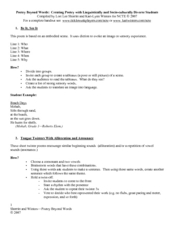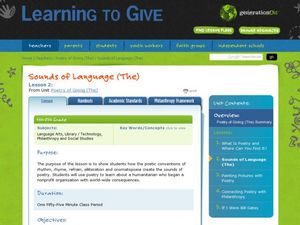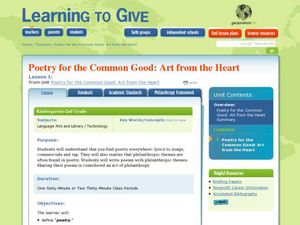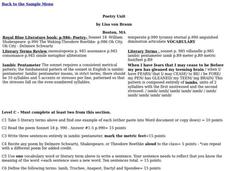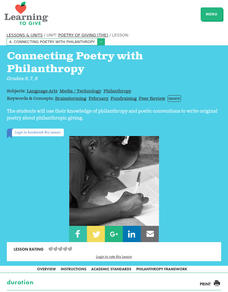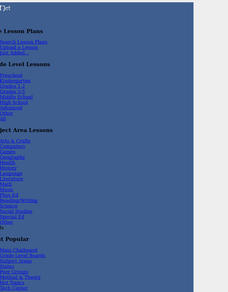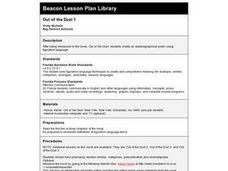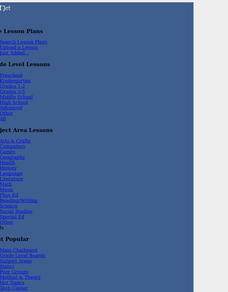Curated OER
Poetry Beyond Words: Creating Poetry with Linguistically Diverse Students
Models of and directions for how to write 20 different types of poems are featured in an NCTE resource. The introduction to each form highlights the embedded concepts. For example, tongue twisters encourage poets to use alliteration and...
National Endowment for the Humanities
The Beauty of Anglo-Saxon Poetry: A Prelude to Beowulf
Riddle me this! What do kennings, caesura, and alliteration have to do with the Nowell Codex? Introduce class members to Anglo-Saxon poetry and prepare readers for a study of Beowulf with a series of activities that includes asking...
Curated OER
The Poetry of Giving
Learn about philanthropy and poetic conventions with an inclusive lesson about Bill Gates. After learning about Mr. Gates' humanitarian efforts in the world, sixth graders use alliteration, onomatopoeia, rhyme, rhythm, and refrain in...
Curated OER
Poetry: A Picture of Feelings
Young scholars take a field trip to a place of interest. After the trip they share with a partner their most memorable memory about it. Later, they paint a picture representative of the trip and illustrate it with a poem using at least...
Curated OER
Pictures in Words: Poems of Tennyson and Noyes
Students examine how Tennyson and Noyes use words to paint vivid pictures. They read and analyze two poems, complete an online scavenger hunt, complete a worksheet, and write examples of alliteration, personification, metaphor, simile,...
Curated OER
Pictures in Words: Poems of Tennyson and Noyes
Students analyze poems by Tennyson and Noyes. They identify examples of alliteration, onomatopoeia, personification, metaphor, and simile. Students create examples of alliteration, onomatopoeia, personification, metaphor, and simile.
Curated OER
Sound Devices in Poetry, Fiction and Nonfiction
Students examine the impact of sound devices in poetry. In this poetry instructional activity, students read the listed poems and identify uses of alliteration, repetition, consonance, rhythm, rhyme, and slang. Students discuss how sound...
Curated OER
Lots of Lessons from Aesop
Aesop’s Fables offer young learners an opportunity to study figurative language. After reviewing theme, simile, alliteration, and metaphor, model for your pupils how to identify examples of these devices in the fable. Class members then...
Curated OER
Poetry for the Common Good
Learners identify examples of philanthropy in poetry or song. For this philanthropy lesson, students examine several poems such as Give by Carrie A. Thomas and identify concepts of philanthropy in the poem. Learners construct their own...
Curated OER
Connecting Poetry with Philanthropy
Students use their knowledge of philanthropy and poetic conventions to write original poetry about philanthropic giving. In this philanthropy lesson, students write poetry based on philanthropy using poetic conventions. Students...
Curated OER
Teaching Poetic Devices
Students identify and analyze the poetic devices of alliteration, metaphors, onomatopoeia, personification, rhyme, and similes. They identify examples of each poetic device in songs, complete a worksheet, and teach the devices to a...
Curated OER
The Nature of Haiku Poetry
Students brainstorm elements of nature art prints and photos. They identify the syllable count of Haiku and take a nature walk. They write Haiku poems while practicing the use of simile, alliteration, metaphor, and analogy to describe...
Curated OER
The Power of Poetry
Learners utilize the Internet to research figures of speech used in poetry and poetry terms
Curated OER
Poetry Unit
Students, after examining three forms of poetry, review and document a variety of literary terms. Vocabulary words are enveloped into the literary terms as well and are cited from each selection by each student.
Curated OER
Connecting Poetry with Philanthropy
Young scholars examine the different types of poetic conventions. They write a poem about philanthropy using these conventions. They illustrate their poem with artwork of their choice.
Schools United to Provide Enhanced Resources Network
AP English Project: Journal of Literary Terms and Devices
To prepare for the AP English exams, individuals are asked to create a notebook of literary terms and devices. The terms must be defined, accompanied by representative artwork, and illustrated by an example drawn for a named source. A...
Curated OER
Modern American Poetry
Students identify different types of literary terms in poems. They read different poems and create a packet summarizing them. They write a poem of their own and a biography of one of their favorite poets.
Curated OER
Out of the Dust 1
Students review figurative languages terms and examples. They read the first entry in the book, Out of the Dust, and discuss the images created by the author. Then they create an autobiographical poem using figurative language.
Curated OER
Focus on Figurative Language
Using the poems "First Snow" by Ted Kooser and "Eating Alone" by Yi-Young Lee (or other suggested poems by Robert Frost or Sara Teasdale), middle schoolers search for examples of figurative language. Guide your learners by discussing...
Curated OER
A Prelude To Beowulf
Students study the literature and literary techniques of the early Middle Ages, thus preparing students to read Beowulf with an appreciation for its artistry and beauty. Students solve online riddles, write riddles and study Anglo-Saxon...
Curated OER
Figurative Language Scavenger Hunt
Eighth graders analyze and interpret figurative language. They listen to some examples of poetry which use figurative language. Then, they divide into groups and attempt to find more examples. Finally, 8th graders write what the poet is...
Curated OER
Out of the Dust 4
Eighth graders read the novel, "Out of the Dust," and create a free-verse poem about a treasure of their own. They use the attached checklist to evaluate their own poem.
Curated OER
A Courtin' We Will Go
Learners investigate dialect in poetry as an indication of a people's culture in literature. They write a poem about dating in this era.
Curated OER
Comparatively Speaking
Students practice creating similes and metaphors together as a class. Individually students create similes and metaphors and illustrate them.


